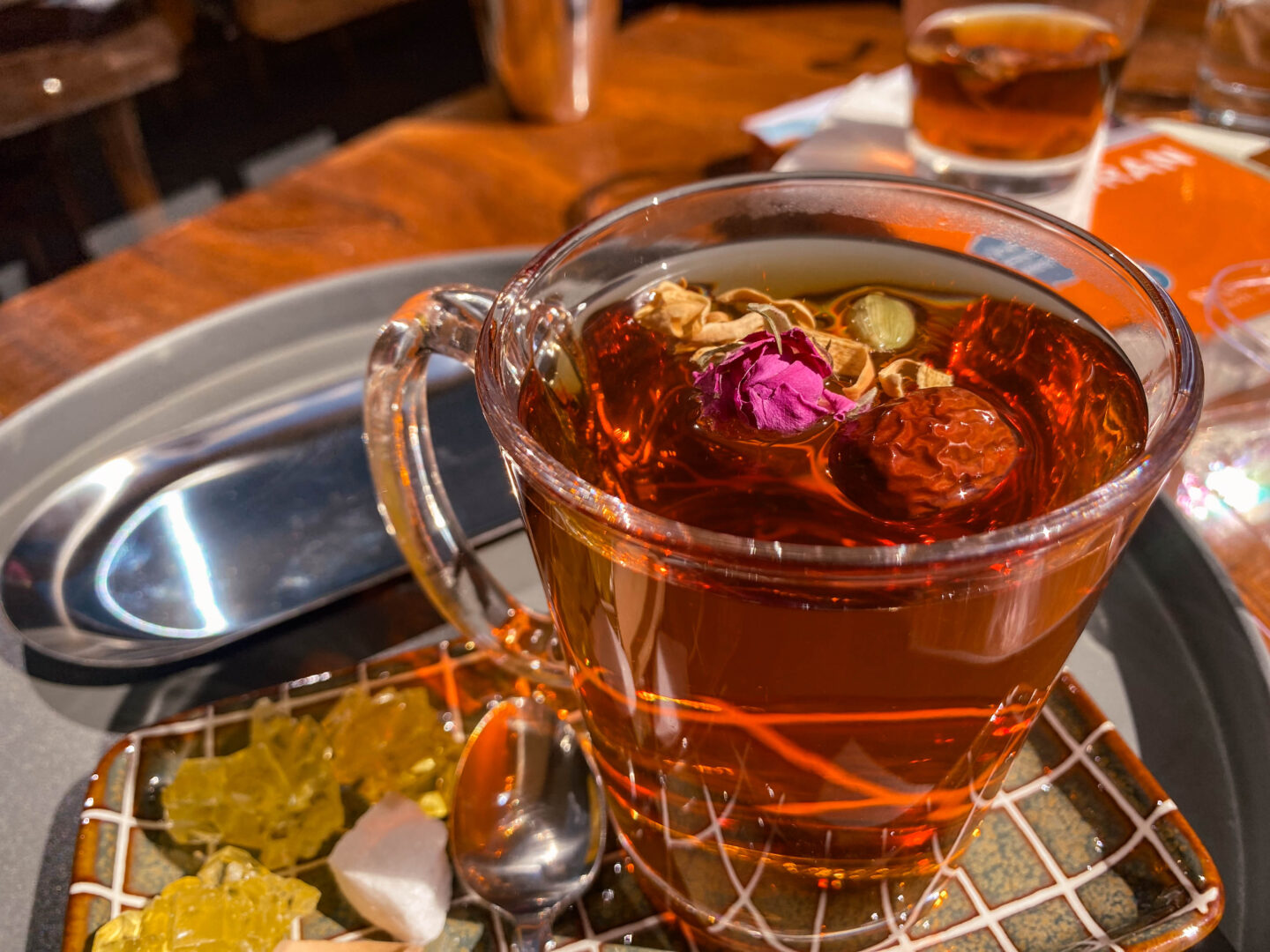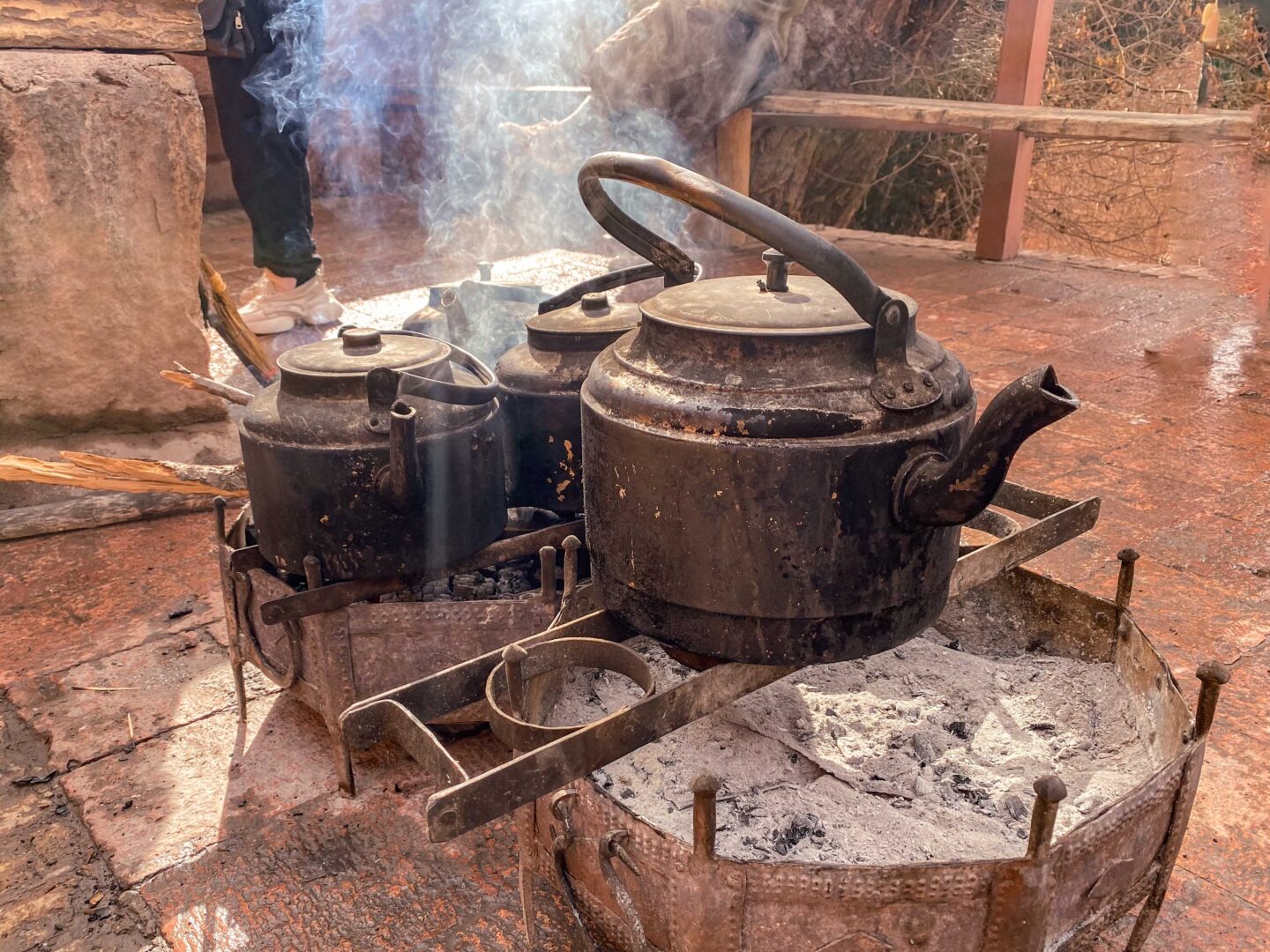
Längerer Beitrag – schneller Überblick:
Iran is the first truly exotic country for us. And by exotic we mean: Everything is somehow different here. We can't stop being amazed. We smile, laugh, are irritated and sometimes even desperate. But the best thing is that no matter what, there is always someone there to ask if we need help or just a cup of tea.
Tea
Tea always helps. Tea is calming, soothing, sociable and a traditional drink. Tea is often drunk with sugar. However, this is not put in the tea, but in the mouth. There the sugar melts with the tea. Wonderful, a dream for all children who love snacking on sugar cubes.
I myself have found that I like tea with a small rose blossom and a little sawdust, which is actually dried orange blossom. There are also fruits that are often served. In German, you could say they are red or Chinese dates. They look like cherries, wrinkly like dates and are delicious when soaked in tea.


Chai Nabat - Nabât-e Saferâni
Chai Nabat, often referred to as Persian saffron sugar tea, is a traditional Iranian tea speciality prized for both its unique flavour and potential health benefits. This tea combines the aromatic nuances of saffron, one of the world's most expensive spices, with the sweetness of cane sugar (nabat) to create a warming and soothing beverage. Here are some of the remarkable effects and benefits of Chai Nabat:
Calming effect, antioxidant properties, digestive, mood-enhancing, heart-healthy and blood sugar-regulating. Although I can't believe the latter in particular. Because the sugar consumption here is enormous!

Food
Eating usually takes place on the floor. Naturally, you take off your shoes, often sit cross-legged on thick, soft carpets and have your food ready to eat. As in Turkey, the food is placed in bowls and dishes in the centre of the table or on the tablecloth and you take whatever you want from your empty plate. Unlike here. At home, plates are often already filled in the kitchen and nibbling from each other's plates tends to be "condemned" with a sniff. (Incidentally, the soft carpets invite you to simply stretch out and take a nap after dinner, but somehow we don't dare. Politeness and all that).
The food is never placed directly on the carpet. If we are invited privately, there is a nice tablecloth. In restaurants and with younger people, plastic tablecloths are spread out, which are then crumpled up with the leftovers and paper plates after the meal and thrown away. Anyone who knows us knows our attitude to this.
The food itself is less spicy, but much more interestingly flavoured than in Turkey, for example. You'll find saffron, mint, coriander and all kinds of oriental spices. Sometimes the food is sweetened with dates, sometimes we suddenly taste cardamom. And we realise: When everything is not so spicy, it tastes better. And: you don't have to finish your food. A no is accepted.



Courtesy & invitations
This brings us to the next observation: Iranians are very polite. Very courteous and friendly. They don't blow their noses loudly, but go outside to do so. They always smile and say thank you. Even if we are actually obliged to thank them. We also observe great politeness amongst ourselves. Nobody gets loud here (unless you sing or cheer after singing!). Even the police and the military, who keep stopping and checking us, are friendly. We are given emergency telephone numbers just in case and are wished a good night. And again and again: "Thank you for visiting Iran."
We have already reported on the many invitations that are genuinely meant and that people are happy to receive in recent posts. And if we're honest, we're already looking forward to the next ones. Even if we can't wait for them, they will probably come.

Tarof
But we also learn about another politeness. It's called Tarof here, a so-called rite of passage that really is our undoing. Simply because we don't know it and, to be honest, can't do it in our direct manner. I am quoting from a guidebook:
"When the taxi driver tells you after the journey that you are his guest and don't have to pay anything, or when shopkeepers invite you for a lemonade, this is not meant seriously, but a courtesy ritual that regularly puts travellers' foot in their mouths. Travellers who don't say no three times and pay anyway, but simply take the liberty of leaving, will be met with puzzled faces. This is because the invitation on the one hand and the grateful refusal on the other can only be understood as an expression of appreciation for the other person. If both sides are aware of this, it goes without saying that the taxi driver is being paid for his services, but that you have taken the time to be friendly to each other. This ritualised politeness extends to every conceivable area of life and has a name: "tarof".
And then we look into beaming faces that genuinely convey to us that having us as guests is the greatest thing ever. And we are so unsure whether this is Tarof or not. But we learn: I then simply ask: "Is that Tarof?" And they often laugh and say: "No, no, not tarof! We don't do that with tourists! They can't do that!"

A little tip in passing
These are all just our own experiences. A very personal note and possibly different from what other travellers may have experienced. So: experience it for yourself is the best recommendation!
There are still so many impressions that I have noted down. Next time we'll talk about money, language and then later about traffic and everything that seems important, funny or remarkable about cars.
Merci for "travelling with us
We are thinking about taking another break from travelling in the summer and visiting our families in Germany and Switzerland. One of the ideas is to organise a Lecture about our long journey to the Persian Gulf to prepare. If you would like to, what would interest you the most? We will also tell stories here that don't find a place here on the blog. We're thinking of the Bern and Berlin area - simply because we have family there. But other places are also conceivable. Feel free to write to us.
Do you think our travel experiences might be of interest to others? Then you can share the Share post quietly. By e-mail or however you want to do it.
In addition, if you haven't already done so, you can use our Newsletter subscribe. Here you will receive all our experiences in your mailbox whenever we publish something new or once a week on Fridays: live-pur.ch/newsletter
We are also very happy to hear your views, your tips or your questions. Just comment on the post!
Wonderful these explanations! 🥰
A little of this politeness would do us good too. 👍
LG Rachel
Oh dear, we just enjoy what is and try to be as polite as we can. That's all we can do, but that's something, isn't it?
Best wishes from a little tea room.
Yes, do that.
Show the people there that we Europeans are not so cold and rude.
Enjoy the tea. 🥰👍
And be careful! ☝️
Save sugar elsewhere. 🤣😂
LG from Racheli